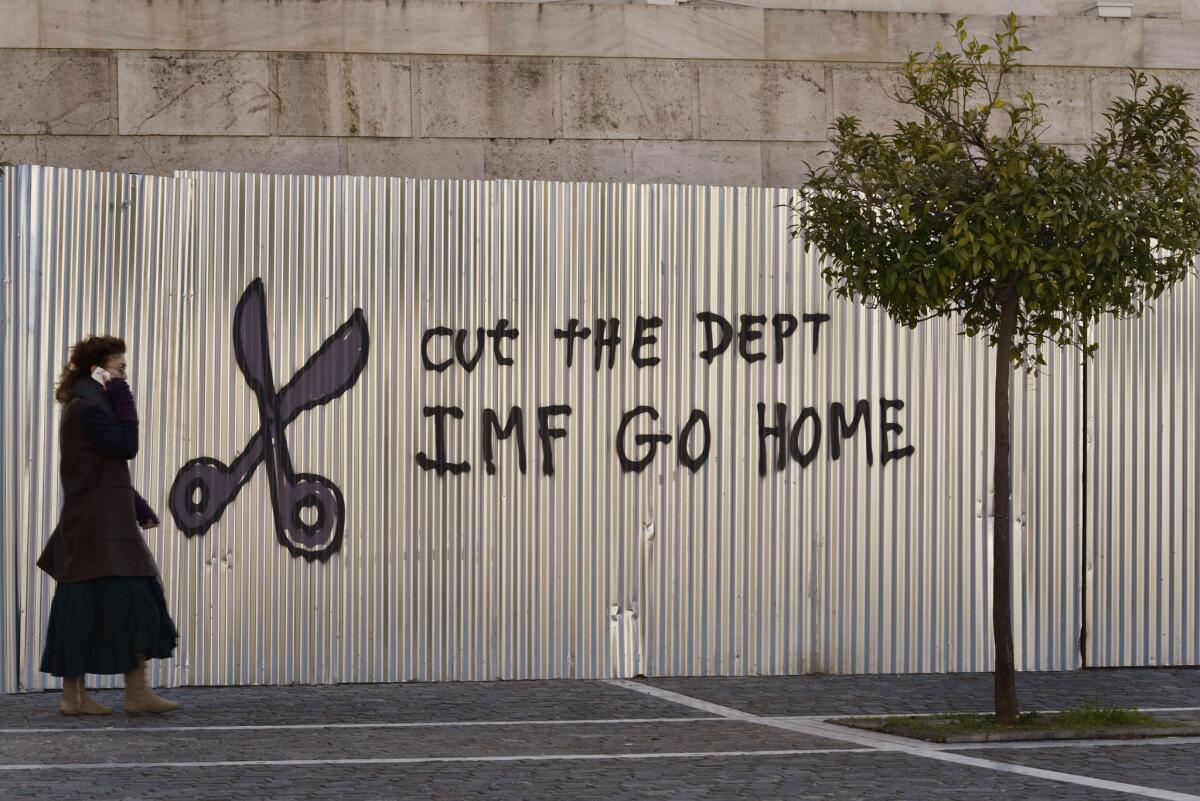Story So Far: What you need to know to understand the Eurozone talks

- Share via
Eurozone finance ministers are meeting Friday for talks on Greece's request for an extension to its expiring bailout agreement. Failure to reach a deal could accelerate financial panic and push Greece out of the Eurozone. Here are some things you need to know to understand the Eurozone talks.
What is the Eurozone?
The Eurozone is a union of 19 European nations who use the euro as national currency. The nations are: Austria, Belgium, Cyprus, Estonia, Finland, France, Germany, Greece, Ireland, Italy, Latvia, Lithuania, Luxembourg, Malta, the Netherlands, Portugal, Slovakia, Slovenia and Spain.
What are the Eurozone talks about?
Finance ministers from the 19 countries in the Eurozone are meeting in Brussels for talks on Greece's request for an extension to its expiring bailout agreement. If a deal isn't reached, it could affect markets across the continent and beyond.
"The Greek government has done all it should at every level in an effort to find a mutually beneficial solution," government spokesman Gabriel Sakellaridis said ahead of the meeting. "Conditions have matured for a solution to be found."
This is the third attempt for Eurozone finance ministers in 10 days to settle the standoff that could leave Greece locked out of international markets without money within weeks.
Read moreHow dire is Greece's financial crisis?
Greece is Europe's most indebted country and a bailout has kept its economy afloat for several years. Since their economy skidded off the fiscal cliff, Greeks have seen their incomes drop by 25% and the unemployment rate climb to 27%, driving more than 300,000 young workers abroad to seek work.
Greece received a 240-billion euro (about $270 billion) bailout, stitched together by the European Union, the European Central Bank and the International Monetary Fund -- a bailout that expires Feb. 28. The government will need help to pay off billions in debt obligations that are due in coming months.
Read moreWhat does Greece want from the talks?
Greece is proposing a short-term funding extension to tide the country over until the summer, when a new debt deal could be hammered out for the country's crushing debt. Precise details of Athens' extension request remain unclear, but the newly-minted government has said it would honor the current program called the Master Financial Assistance Facility Agreement -- if certain austerity measures are eased.
Greek Prime Minister Alexis Tsipras met with fellow European Union leaders in Brussels on Feb. 12 to explain his country's desire to end austerity that measures Greeks blame for shrinking the economy. Tsipras took office in January with a promise to relieve austerity measures.
Read moreHow do other Eurozone countries feel?
Germany has contributed more than any other European country to Greece's bailout and has been among the most insistent that the country honor its commitments.
Athens had formally requested a six-month extension of its loan agreement on Feb. 19, a request Germany rejected, calling it a "Trojan horse" that would allow Greece to shirk its commitments to reform.
Special correspondent Anthee Carassava contributed to this report.
Sign up for Essential California
The most important California stories and recommendations in your inbox every morning.
You may occasionally receive promotional content from the Los Angeles Times.








